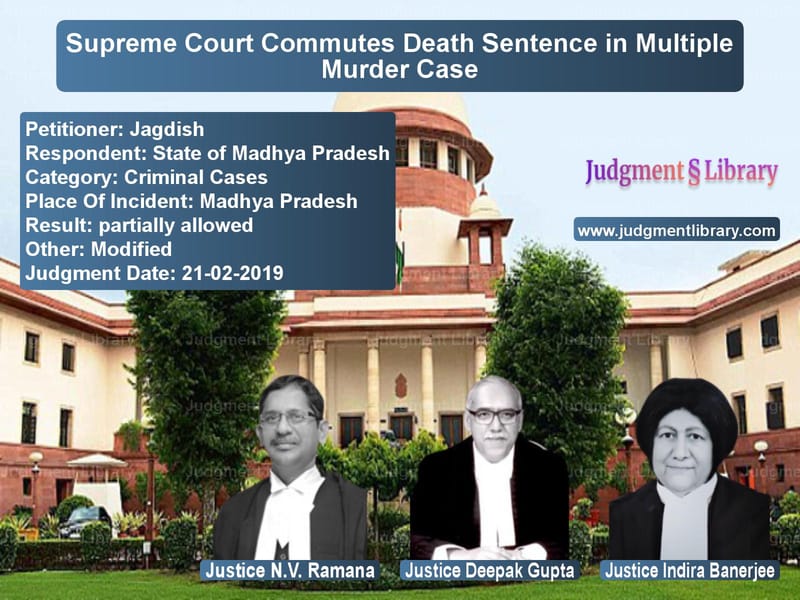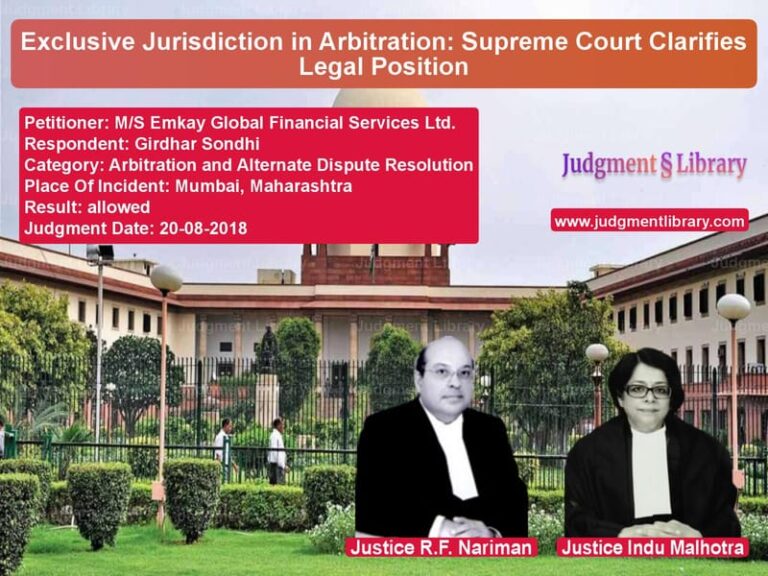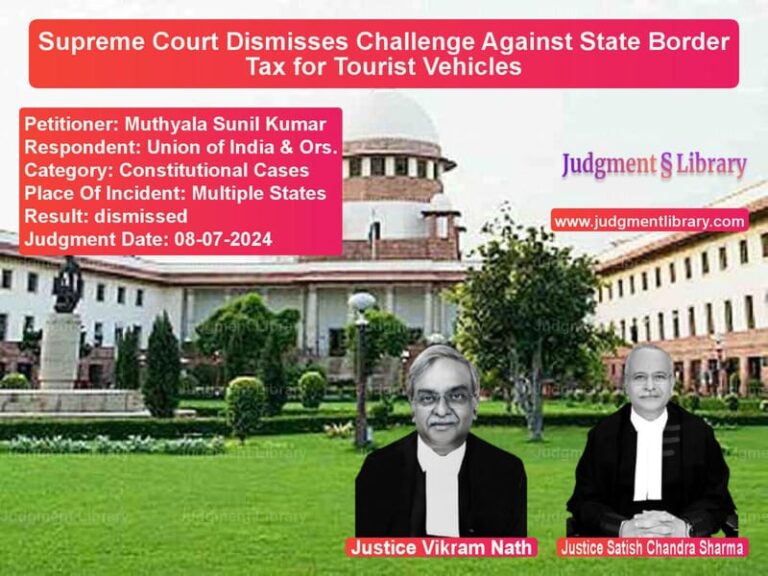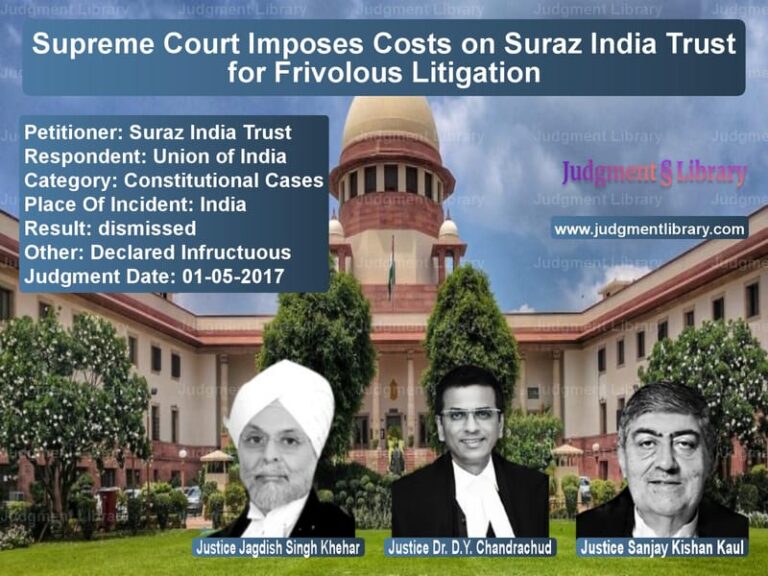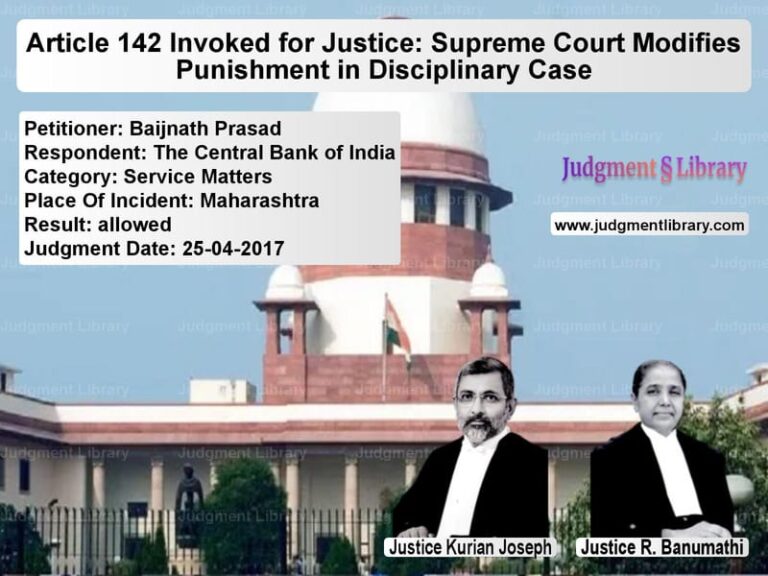Supreme Court Commutes Death Sentence in Multiple Murder Case
The case of Jagdish vs. State of Madhya Pradesh concerns a gruesome crime in which the petitioner, Jagdish, was convicted of murdering his wife and five children. The Supreme Court examined whether the death sentence imposed on him should be commuted due to the prolonged delay in deciding his mercy petition and the time spent in incarceration.
Background of the Case
Jagdish was found guilty of murdering his wife and five children. The Trial Court sentenced him to death on April 24, 2006. The Madhya Pradesh High Court upheld the conviction and confirmed the death sentence on June 27, 2006. Jagdish then appealed to the Supreme Court, which dismissed his appeal and confirmed the death sentence on September 18, 2009.
Following the confirmation of his death sentence, Jagdish filed a mercy petition with the President of India on October 13, 2009. However, the petition remained pending for almost five years and was ultimately rejected on July 16, 2014.
Legal Issues Before the Supreme Court
The Supreme Court had to determine:
- Whether the prolonged delay of nearly five years in deciding the mercy petition justified commutation of the death sentence to life imprisonment.
- Whether Jagdish’s 14-year incarceration before execution amounted to double punishment.
- Whether the case met the ‘rarest of rare’ threshold required for the death penalty.
Petitioner’s Arguments
The counsel for Jagdish contended:
- There was an unjustified delay of nearly five years in deciding the mercy petition, violating the principles of fair and speedy justice.
- Jagdish had already spent 14 years in prison, which itself was a severe punishment.
- The execution of the death sentence at this stage would be arbitrary and amount to imposing two punishments.
- Jagdish was suffering from mental illness, which was not considered in previous proceedings.
Respondent’s Arguments
The State of Madhya Pradesh, on the other hand, argued:
- The crime was extremely brutal, involving the murder of six innocent family members.
- Delays in deciding mercy petitions should not automatically result in commutation of the death sentence.
- The case fell under the ‘rarest of rare’ category, justifying capital punishment.
Supreme Court’s Observations
The Supreme Court acknowledged the horrific nature of the crime but focused on the procedural delay in deciding the mercy petition.
“The mercy petition is the last hope of a person on death row. Every dawn gives rise to a new hope that his petition may be accepted, and by nightfall, this hope dies. Inordinate and unexplained delay in deciding the mercy petition and the consequent delay in execution of the death sentence for years on end is another form of punishment.”
The Court cited the precedent in V. Sriharan alias Murugan vs. Union of India, which held that prolonged delay in executing a death sentence can be a valid ground for commutation.
Analysis of Delay
The Court noted:
- The trial and appeal processes were completed efficiently, with the conviction confirmed by the Supreme Court in 2009.
- The mercy petition was filed on October 13, 2009 but was forwarded by the Madhya Pradesh government to the Ministry of Home Affairs only on October 15, 2013, after more than four years.
- The President of India rejected the petition on July 16, 2014, leading to a delay of nearly five years in its disposal.
- The State of Madhya Pradesh provided no explanation for the inordinate delay.
Final Judgment
After reviewing all the facts, the Supreme Court ruled:
- The death sentence was commuted to life imprisonment.
- However, given the gravity of the crime, Jagdish would remain in prison for the remainder of his life without any possibility of remission.
- The Review Petition and Writ Petition were partially allowed.
Conclusion
This judgment reaffirms the principle that while heinous crimes deserve strict punishment, procedural fairness and constitutional safeguards must be upheld. The ruling emphasizes that undue delay in deciding mercy petitions can result in commutation of the death sentence, ensuring that justice remains fair and humane.
Petitioner Name: Jagdish.Respondent Name: State of Madhya Pradesh.Judgment By: Justice N.V. Ramana, Justice Deepak Gupta, Justice Indira Banerjee.Place Of Incident: Madhya Pradesh.Judgment Date: 21-02-2019.
Don’t miss out on the full details! Download the complete judgment in PDF format below and gain valuable insights instantly!
Download Judgment: Jagdish vs State of Madhya Prad Supreme Court of India Judgment Dated 21-02-2019.pdf
Direct Downlaod Judgment: Direct downlaod this Judgment
See all petitions in Murder Cases
See all petitions in Bail and Anticipatory Bail
See all petitions in Judgment by N.V. Ramana
See all petitions in Judgment by Deepak Gupta
See all petitions in Judgment by Indira Banerjee
See all petitions in partially allowed
See all petitions in Modified
See all petitions in supreme court of India judgments February 2019
See all petitions in 2019 judgments
See all posts in Criminal Cases Category
See all allowed petitions in Criminal Cases Category
See all Dismissed petitions in Criminal Cases Category
See all partially allowed petitions in Criminal Cases Category

